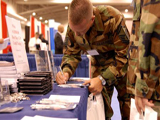Agency Seeks To Clear Hiring Obstacles For Veterans
Post Views 0
His potential employers are not convinced by his years of experience and that he has the requisite skills and competence to do justice to the work assigned to him.
“I could run a warehouse, but they don’t put that on your DD-214,” said Mr. Byrd, 38, referring to the official document troops receive upon leaving service. “You do get skills in the military, but people don’t seem to understand that.”
Malcolm Byrd said that since his attempts have failed, “I’m not hoping for the job of my dreams,” he said. “I just want to be gainfully employed.”
The veterans are facing a high rate of unemployment and somehow, the knowledge and skills that they garnered in their military life just does not translate into peacetime jobs.
Center for a New American Security, a research organization based in Washington said that a recent study that they conducted regarding veterans and their hiring problems revealed that the prime impediments to hiring veterans was inability to match their military skills and competence with civilian work.
Civilian employers do not always realize that military-specific jobs — such as machine gunner, tank driver or helicopter crew chief — have some components that are directly comparable to civilian environments,” said the report, which was based on interviews with officials from 69 companies.
The Department of Veterans Affairs, to address this prime issue, invited job counselors to Detroit last week, for its biggest hiring fair of the year. The fair attracted 8000 veterans.
The fair helped the veterans, amongst them, grenadiers, infantry squad leaders and logistics officers to make resumes that private companies and government agencies would relate to.
The three day fair was a grand success and, according to the Department, more than 1,300 jobs were offered to the veterans. The success of the fair has prompted the organizers to hold at least nine more fairs this year.
The secretary of veterans’ affairs, Eric Shinseki, said that many veterans after their service had marketable skills, “But unless we can translate that into understandable business language, it’s hard for the employer to get a full appreciation for the skills and knowledge the veteran will bring,” he said.
Veterans of the Iraq and Afghanistan, continue to grow. With Government assurance that they were going to recall their military, this number will grow further. The unemployment rate for veterans of the Iraq and Afghanistan is currently standing at 12.7 percent. With the expected influx of more veterans, the rate is expected to grow. The unemployment rate for nonveterans is 7.7 percent.
The unemployment rate for the younger veterans is even higher and the study shows that a majority of these young veterans do not have a college degree and hence, fallout from the competition from those who have the requisite academic qualifications.
Some employers also expressed ungrounded fears of veterans being disadvantaged by psychological problems like post-traumatic stress disorder, given the stressful nature of their work.
The Center for a New American Security, however, found that most companies said that they would like to hire veterans as they are seen to be strong leaders who fit in well into a structured society. Moreover, a military life makes them more adaptable, disciplined, hard working and a team player.
Margaret C. Harrell, a senior fellow at the center and a co-author of the report, said veterans found it difficult to often struggle to put in plain, easy explainable words their skills to employers. Moreover, licensing requirements imposed by states on certain professions, hurt them more than other professions.
Veterans even if they have been medics and hospital corpsmen, would have to take additional training to become nurses or emergency medical technicians, inspite of obviously having considerable skills in this regard. “People are less concerned when we talk about giving commercial truck driving jobs to military truck drivers,” Ms. Harrell said. “But it’s a bit harder to know how military medical training translates into the civilian world.”
Glenn McCartan, a former Marine Corps company commander who left active-duty service in 2009, said that he shared the frustration of his fellow veterans, who were given jobs that did not carry as much worth or respect as their military ones. “A lot of veterans are hungry,” said Mr. McCartan, they want to be productive, but they are held back.”
Agency Seeks To Clear Hiring Obstacles For Veterans by Harrison Barnes


 The Economy Under a Trump Presidency
The Economy Under a Trump Presidency